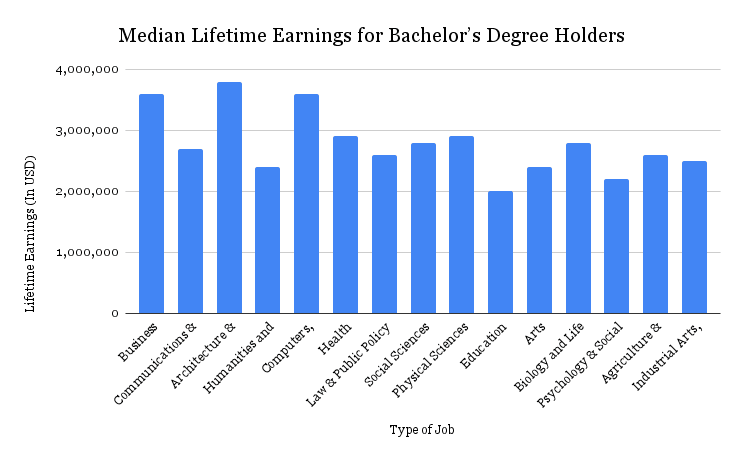According to a Georgetown University Center on Education and the Workforce (CEW) report, the average college graduate can expect to earn $2.8 million over a lifetime. The average high school graduate can expect to earn $1.6 million.
That translates into a difference of about $1.2 million in earnings, or $30,000 per year over a 40-year career.
These benefits of college may ultimately cost less than many people believe. Most students receive financial aid. You may qualify for grants or scholarships. The Alliance scholarship program has awarded thousands of deserving students millions of dollars in scholarships. Learn more here.
Ultimately what a student pays for college can be less than the full tuition. And the return and the return on investment can be enormous.
More School, More Earning Power
The CEW report shows that any educational advancement leads to an advantage in earnings. People with some college but no degree average $300,000 more over their lifetimes. Those with an associate degree average $2 million throughout their working lives, $400,000 more than the average high school graduate.
Earnings power significantly increases for people with advanced degrees. In fact, people with PhDs earn, on average, $4.0 million in their careers, more than twice the typical high school graduate.
Equally important, unemployment rates are lower for people with higher education. According to the U.S. Bureau of Labor Statistics, 2021 unemployment rates for college graduates were 3.5% for those with a bachelor’s degree and 2.6% for those with a master’s. It was 6.2% for high school graduates with no college and 8.3% for those with less than a high school diploma.
“College is a long-term investment and having a degree significantly increases your earning potential”
Keith Brannan, Vice President of Financial Security Planning, Country Financial
The Skills to Succeed
One reason for the higher earnings power may be the portable skills you can acquire in college. That is, skills that you can transfer from one job to another.
This would include learning a trade at a vocational school, taking the appropriate graduate school prerequisite courses for professional careers (medical, legal, engineering), and general skills necessary for success in the working world.
Would you like to work in sales? Take an acting class. Are you interested in marketing? Build a strong network of friends and colleagues. Many employers prefer hiring college graduates due to their increased communication skills, better work ethic, and good interpersonal skills.
Contacts and Career Opportunities
College can also help you build an expansive social/professional network while increasing your knowledge of many different subject areas and helping you develop essential life skills, i.e., the ability to bounce back from failure and handle success.
College opens the doors to many opportunities in both employment and life experiences. Simply put – for most people, if you don’t go to college, you don’t have the same kinds of opportunities.
What Kind of College Should You Attend
You might want to go to college to have a better leg up in the job market. Or to learn a specific skill or trade. Maybe you want to start building a network of like-minded people to help accomplish your entrepreneurial objectives (i.e., starting the next Tesla). You may just love dining hall food!
Remember, college is not an extension of high school; it’s a launching pad into a greater world of opportunity. And there are myriad decisions to be made when beginning the process. Take a deep breath. Ready?
Top Growing Industries/In-demand Careers
The CEW study also shows how median earnings appear closely related to the field of study you choose. Be sure that you don’t let the earnings alone sway you. Median incomes suggest a wide range of salaries. A weak architecture & engineering student may not do as well as someone who’s strong in communication & journalism. Stick with what interests you.
Median lifetime earnings for bachelor’s degree holders.

Yes, if money is your goal and you have the aptitude, engineering is the major with the most earnings potential. Like most undergraduate fields, it’s wide open and can include aerospace, nuclear, electrical, civil, chemical, petroleum, or mechanical engineers. They’re all in high demand.
But if you want to enter one of the careers with the highest lifetime earning potential, then you will need to consider graduate school in medicine, law, or business. People with professional degrees earn, on average, $4.7 million in their careers, more than 2.5x the typical high school graduate and almost 40% more than someone with a bachelor’s degree.
Either way, college can be the key to success. Financial and personal.
Make sure you get all the benefits of a college education that you seek. These articles will help you choose from different types of colleges and how to get the most out of every college visit. And be sure to check out The Alliance College Guide. It explains what you need to know about choosing, preparing for, applying to, and paying for college. All in clear, no-nonsense language.
Additional Resources
Post-Secondary Employment Outcomes Explorer – Interactive tool from the U.S. Census Bureau shows earnings outcomes for recent graduates of partner colleges.
CareerShip – Find careers that match your interests with this interactive tool.
New Study: College Degree Carries Big Earnings Premium, But Other Factors Matter Too – Forbes, Oct. 11, 2021